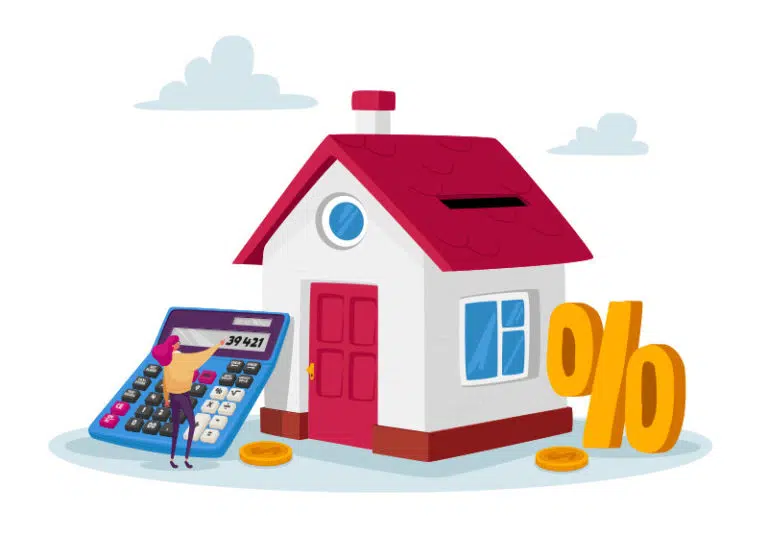Mortgage Calculator UK
Getting a mortgage is one of the biggest commitments you’ll make in your financial life. It can sometimes be hard to work out what they’ll cost you. Our mortgage calculator can help.

How does the mortgage calculator work out payments?
Our mortgage calculator uses your loan amount, interest rate, and an optional deposit to provide you with an estimate of your monthly mortgage repayments. It’s important to note that the results generated by the calculator should only be used as a guide, as various factors can influence the actual repayment amount. Try changing the differnt inputs.
Mortgage Calculator
A Mortgage calculator can help you work out your sums when you’re looking at how much money you may be able to borrow to buy a property.
It can also give a rough indication to what your monthly outgoing could be. However, these can alter depending on your circumstances, but it is a good starting point until a broker/lender has the full details.
You can add your income or salary and then play with different multipliers to see what the potential outcome could be.
Our mortgage calculator serves as a valuable guide in your homeownership journey. Whether you’re a first-time buyer or a seasoned homeowner, we’re here to assist you in achieving your property ownership goals.
Is there a difference in interest rates for good credit or bad credit?
Usually prime credit (good credit) will offer a better interest rate to someone with bad credit, this is due to the risk factor to the lender.
If you have further questions or require personalised mortgage advice, don’t hesitate to reach out to our team of experienced professionals. Your dream home may be closer than you think, and we’re here to help you make it a reality.
The two most common types of mortgages
Fixed-Rate Mortgages:
With a fixed-rate mortgage, the interest rate remains constant During the fixed rate period. This means your monthly mortgage payments remain consistent, providing stability and predictability for budgeting purposes.
- Fixed-rate mortgages are typically available in various term lengths, such as 2, 3, 5, 10 years. The longer the term, the lower your monthly payments, but the more interest you’ll pay over the life of the loan.
- These mortgages are popular among homeowners who prefer the security of knowing their monthly payments won’t change, regardless of fluctuations in the broader economy or interest rates.
- After the fixed rate term has finished, you will normally be transferred to a variable rate.
- When you go onto a variable rate, your payments can either go up or down, depending on the Bank of England Interest rates and your lenders rates.
- You can at this stage remortgage to get a better deal
Variable rate mortgages:
Variable-rate mortgages, feature interest rates that can fluctuate periodically based on changes in a benchmark interest rate, such as the Lender’s own variable rate or Bank of England Base Rate
- Initially, variable-rate mortgages often offer lower interest rates and monthly payments compared to fixed-rate mortgages, making them attractive to some borrowers, especially in a low-interest-rate environment.
- However, the interest rate on a variable-rate mortgage can adjust regularly which can result in unpredictable changes to your monthly payments. These adjustments can be ubject to caps and floors to limit extreme fluctuations.
- Borrowers considering A variable rate mortgage should carefully assess their tolerance for potential payment increases and their ability to manage financial uncertainty over the life of the loan.
Understanding the differences between fixed-rate and variable-rate mortgages, as well as the nuances of each interest rate type, can help borrowers make informed decisions when selecting the right mortgage product for their financial needs and goals. It’s crucial to consider factors such as your risk tolerance, budgetary constraints, and long-term financial plans when choosing between these options. Consulting with a mortgage advisor can also provide valuable guidance tailored to your individual circumstances.
Mortgage Calculator FAQ
Understanding Mortgages
Are you considering buying a property in the UK and feeling overwhelmed by the financial jargon surrounding mortgages? As a reputable mortgage broker, we understand the complexities involved in navigating the mortgage landscape. One tool that can greatly aid you in this journey is a mortgage calculator. In this article, we’ll delve into what a mortgage calculator is, how it works, and answer some frequently asked questions to help demystify the mortgage process.
What is a mortgage?
Let’s start with the basics. A mortgage is essentially a substantial loan typically obtained from a bank or building society, enabling you to purchase a property, be it a house, flat, or plot of land. The property you’re purchasing serves as Security for the loan, meaning that if you fail to keep up with repayments, the lender has the right to sell it to recover the debt.
Repayments for the borrowed amount, along with accrued interest, are made over an agreed-upon period, which can extend up to 40 years depending on your age and financial circumstances.
How do mortgage interest rates work?
Interest rates play a crucial role in determining the cost of borrowing for your mortgage. When you secure a mortgage loan, the lender applies an interest rate to the amount borrowed. This interest rate represents a percentage of the loan amount and is added to your monthly mortgage payments. Consequently, any fluctuations in the mortgage interest rate can directly impact your repayment amount.
What is a mortgage repayment?
A mortgage repayment refers to the regular payments made by the borrower to the lender, usually a bank or financial institution, to repay the borrowed funds. These payments encompass both the principal amount borrowed and any interest charges incurred.
How accurate are the results provided by the mortgage calculator?
While mortgage calculators offer estimates based on the information provided, they may not reflect the exact terms you’ll receive from a lender. Factors such as credit history, additional fees, and market conditions can affect your final mortgage terms.
Can I use a mortgage calculator for different types of mortgages?
Yes, most mortgage calculators can be used for various types of mortgages, including fixed-rate, variable rate and interest-only mortgages. However, it’s essential to ensure that the calculator you’re using accommodates the specific features of the mortgage you’re considering.
How do I use a mortgage calculator to determine affordability?
To assess affordability, input your desired loan amount, interest rate, loan term, and any additional expenses such as property taxes and insurance into the mortgage calculator. The resulting monthly payment should align with your budget and financial goals.
Is it necessary to input a deposit amount into the mortgage calculator?
Yes, most lenders require at least 5% deposit of the overall property value, inputting a deposit amount can provide a more accurate estimate of your monthly mortgage payments. Deposits can significantly affect loan-to-value ratios and interest rates, impacting your overall borrowing costs.
Can I use a mortgage calculator for refinancing purposes?
Absolutely! Mortgage calculators can help you assess the potential savings or costs associated with refinancing your existing mortgage. By inputting your current loan details and proposed refinancing terms, you can determine whether refinancing is a financially viable option for you. We suggest you use our remortgage calculator
Are there any limitations to using a mortgage calculator?
While mortgage calculators provide valuable insights, they may not account for every aspect of your financial situation or the mortgage process. It’s essential to consult with a mortgage adviser to fully understand your options and make informed decisions. Our calculator is a guide only.
What can affect my chances of getting a mortgage in the UK?
There are many factors that can determine how much you can borrow, such as income and existing loans and financial commitments.
Mortgage lenders have their own set of lending criteria, and each lender can be different. This means that if one lender rejects you, another might not. However, it’s best not to make too many applications at the same time.
That’s why it’s usually best to go through a mortgage advisor, such as Clever Mortgages who can assess your situation and then know which lender to apply to.
Generally, a lender will be looking at:
- The amount you want to borrow
- Your income and outgoings
- How much deposit you have
- The type of property you want to buy (certain properties such as flats above cafes and bars are deemed riskier to lenders)
- Your employment status
- Your credit rating
- Your affordability
- If you have had any pay day loans
- Missed or late payments
Getting a mortgage with poor credit
If you have a poor credit history then you might struggle to get approval for a mortgage from certain mortgage lenders. As a specialist mortgage lender, we will still consider your mortgage application based on your affordability, regardless of your financial history.
The main difference with a bad credit mortgage is that your interest rate might be higher, so you might want to factor this in when using our tools. To get a better idea of what interest rates you’re eligible for, you can speak to one of our mortgage advisers for help and advice.
What is stamp duty?
Stamp duty land tax – known in Scotland as land and buildings transaction tax – is a tax payment you have to pay when you buy a property or plot of land which costs more than a certain amount. The amount of stamp duty you pay depends on the type and price of property. It also varies when you buy a commercial building rather than a residential property.
- No stamp duty tax on the value of the property up to £125,000 (Currently the price is capped at £250,000 until Oct 2021 then it reverts back to £150,000) See here for more details
- 2% stamp duty on the property value between £125,001 and £245,000
- 5% on the property value above £250,000
Our mortgage tools and UK mortgage calculator
Working out how much you can afford to pay towards a mortgage should be a priority before beginning your application. Our tools and mortgage calculator for the UK have been designed to help you work out your borrowing situation before getting a mortgage. These can be especially useful if you’re a first time buyer and unsure what house price range you should be looking at. They can also be useful if you’re a home mover or looking to remortgage your current property.
Otherwise, you might be looking for a mortgage for a buy to let property or second home and need to work out how big a mortgage you need.


Free credit report check
You can check your multi agency credit report with Checkmyfile. By clicking the link you will be transferred to their website. www.checkmyfile.co.uk.*
* Checkmyfile offer a 30 day free trial before a monthly fee of £14.99 applies. You may cancel at any time without charge by contacting them.
*Mortgage borrowing is intended to be a guide based on the amount of deposit entered and your income details. A mortgage adviser will fully assess your requirements before making a mortgage recommendation.
See if you pre-qualify for a mortgage
Enquire about a mortgage with our pre-qualifying affordability form. No imprint on your credit score.
Will not affect credit score


